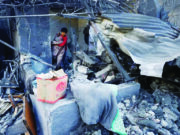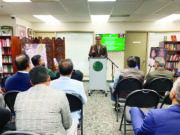By: Abdul Malik Mujahid
Laylatul Qadr (the Night of Power) is described in the Quran as, “better than a thousand months” (97:3). Any action done on this night such as reciting the Quran, remembering Allah, etc. is better than acting for one thousand months which do not contain the night of Qadr.
Allah’s Messenger used to exert himself in devotion during the last ten nights to a greater extent than at any other time.” (Muslim). Allah’s peace and blessings be upon our beloved Prophet.
Aisha, may Allah be pleased with her, related that the Prophet said: Look for Laylatul Qadr on an odd-numbered night during the last ten nights of Ramadan (Bukhari).
The Prophet said: “Whoever prays during the night of Qadr with faith and hoping for its reward will have all of his previous sins forgiven.” (Bukhari and Muslim recorded from Abu Huraira).
Here are some tips of things we can do on the Night of Power and the time before and after it.
1. Take a vacation for Allah
We take a break from our jobs for almost everything in life. Why not this time to focus on worshiping and thanking our Creator.
If this is not possible at least take a few days off if you can. This can make it easier to stay awake at night to do extra Ibadah, not having to worry about getting to work the next day.
It will also facilitate doing Itikaf.
2. Do Itikaf
It was a practice of the Prophet to spend the last ten days and nights of Ramadan in the masjid for Itikaf.
Those in Itikaf stay in the masjid all this time, performing various forms of zikr (the remembrance of Allah), like doing extra Salat, recitation and study of the Quran. They do not go outside the masjid except in case of emergencies, therefore, they sleep in the masjid. Their families or the masjid administration takes care of their food needs.
Itikaf of a shorter period of time, like one night, a day or a couple of days is encouraged as well.
3. Make this special Dua
Aisha, may Allah be pleased with her, said: I asked the Messenger of Allah: ‘O Messenger of Allah, if I know what night is the night of Qadr, what should I say during it?’ He said: ‘Say: O Allah, You are pardoning and You love to pardon, so pardon me.’
“(Ahmad, Ibn Majah, and Tirmidhi).
The transliteration of this Dua is “Allahumma innaka `afuwwun tuhibbul `afwa fa`fu `annee”
4. Recite the Quran
Perhaps you can choose Surahs or passages from the Quran which you have heard in Tarawih this past Ramadan to recite.
If you attend a class where the recitation of the Quran is taught, this is a great time to put your knowledge into practice.
5. Reflect on the meaning of the Quran
Choose the latest Surah or Surahs you’ve heard in Tarawih and read their translation and Tafseer. Then think deeply about their meaning and how it affects you on a personal level.(If you want to study the Quran with more understanding, check out Way to the Quran and Access to Quranic Arabic.
6. Get your sins wiped out
Abu Huraira narrated that the Messenger said: Whoever stands (in prayer) in Laylatul Qadr while nourishing his faith with self-evaluation, expecting reward from Allah, will have all of his previous sins forgiven.
[Bukhari and Muslim).
Don’t just pray using the shorter Surahs that you know. Try to make your prayers longer, deeper and meaningful. If you are familiar with longer Surahs, read the translation and explanation and then pray reciting these Surahs, carefully reflecting on the meaning while you pray. Even if you are only familiar with the shorter Surahs, read the translation and explanation beforehand, and then pray reflecting on the message of the Surahs.
This is a good way to develop the habit of concentration, even in regular prayers, where many of us tend to be fidgety and/or easily distracted.
7. Make a personal Dua list.
Ask yourself what you really want from Allah. Make a list of each and everything, no matter how small or how big it is, whether it deals with this world or not. Allah loves to hear from us. Once this list is ready, you can do three things:
Ask Allah to give you those things
Think about what actions you have taken to get those things Develop a work plan to get those things in future.
8. Evaluate yourself.
Ask yourself those questions that need to be asked. Do an evaluation of where you are and where you are going. Let this evaluation lead you to feel happiness for the good you have done and remorse for the bad you have done. (see a short and a long evaluation guide) This latter feeling should make it easier to seek Allah’s sincere forgiveness when making the Dua mentioned in tip number one above.
9. Make long, sincere and deep Duas
One of the best times to do this is during the last part of the night.
Abu Huraira, may Allah be pleased with him, related that the Prophet said: When the last one-third of the night remains, our Lord, the Glorious One descends towards the heaven of the earth and proclaims: Who is that who supplicates for Me, and I grant his supplication? Who is that who begs Me for anything and I grant it to him? And who is that who seeks My forgiveness, and I forgive him? (Bukhari, Muslim).
That means for instance, waking up one hour before Suhoor time to ask Allah for anything and everything you want that is Halal. This can be done using the Duas of the Sunnah, but also Dua in your own language, with sincerity and conviction.
10. Memorize a different Dua every night
They don’t have to be long. They can be just one line. And be sure to know what they mean generally at least, even if you don’t know the exact translation in English.
You can put them on index cards (or and keep them with you during the day, glancing at them during work, while driving, waiting in line, etc.) Then practice them at night in prayer.
11. Have Iftar with the family
If you’ve spent Iftar time on weekdays in your cubicle at work alone with a couple of dates, now is the last few days you’ll have this Ramadan to spend with your family. Use it wisely.
12. Take the family to Tarawih
Have your spouse and kids missed Tarawih most of Ramadan because you weren’t there to drive them to the Masjid, which is too far away to walk to? If so, do all of yourselves a favor and bring everyone for Tarawih in these last ten nights.
13. Attend the Dua after the completion of Quran recitation
Almost all Masjids where the Imam aims to finish an entire reading of the Quran in Tarawih prayers in Ramadan will be completing their recitation in these last ten nights. They may try to end on one of the odd nights and read the Dua at the end of a reading of the Quran. Attend this particular night’s Tarawih prayer with your family. See if you can attend different Masjids’ Tarawih prayers the night they finish reading the Quran.
14. Finish reading a book on the Prophet
Read about the Prophet’s life, which can increase your love for him and Islam by seeing how much he struggled for Allah’s sake. It may inspire you to push yourself even harder during these last ten nights. This community is built on sacrifice.
15. Plan for the next year
Once you’ve done a self-evaluation, you can plan on where you want to go, at least in the next 12 months. Laylatul Qadr is a great night to be thinking about this (without taking away from your worship), since you’ll Insha Allah, be in a more contemplative state. You may choose to dedicate one night of power for evaluation and one night for planning for the next year.
16. To do list for the Night of Power
Make a to do checklist for each Night of Power. This should define how you would like your night, the one better than a thousand months, to be used. Pick things from this list and define the sequence you would like to do things in. This will help you avoid wasting your time in unproductive chats which common in the festive atmosphere of Masjids at the Night of Power.
Source: www.soundvision.com
Children At Tarawih Prayers?

By: Laura El Alam
In 2007, our Southern California community was privileged to host renowned reciter of the Quran, Shaykh Mishary Rashid Alafasi, at a local masjid.
The shaykh stayed throughout Ramadan and led the tarâwîḥ prayers, and thousands of Muslims traveled to the Islamic Center of Irvine to enjoy the unique and splendid experience. The masjid was filled far beyond its capacity, so spacious tents and enormous carpets were assembled to provide extra, outdoor prayer space for the worshipers.
For me, that Ramadan was especially meaningful because it was the first time our two eldest children (who were our only children, at the time) were mature enough to pray, with focus and patience, alongside my husband and me for more than a few rakʿât.
I enjoyed the serenity and beauty of those tarawîḥ prayers immensely . . . except when I was hit by a scooter.
No, unfortunately, that is not a typo.
While I was in sujûd, a child riding a scooter around the perimeter of the prayer-tent accidentally crashed into me. “Why did a child have a scooter at tarawîḥ prayers?” you may well ask. Well, that was just part of the general chaos! From the moment we had finally located an open parking space in the barely-lit lot that evening, my husband and I had witnessed a carnival-like atmosphere. Dozens of small children ran around, playing games, darting between the cars. It was nighttime, so their escapades were especially dangerous. “Where are their parents?” we asked each other. But we knew the answer: their parents were inside, praying. The real question was why small children were left to play unattended in a dark parking lot, across a traffic-congested street from the masjid.
As soon as he entered the lobby of the masjid, my husband went to discuss the situation with one of the mosque’s leaders. The exhausted brother told my husband that he knew all about the problem of kids running amok; in fact, had just found a three-year-old child alone, wandering a shopping center near the masjid. The boy had almost entered a busy, dangerous intersection when the brother found him and guided him back to safety. The little boy had been searching for his father who was finally located–after exhaustive searching– near the tea dispensers, chatting with friends. He had assumed his son was somewhere nearby.
I am sure there is a story behind each and every wild, lost, or unsupervised child at tarawîḥ. Oftentimes, the father assumes his children are with his wife, and the wife thinks they are with their dad, with the result that the children are completely unattended. Sometimes the parents are so focused on their salah that they don’t notice their child slipping away into the crowd. And let’s face it; some parents don’t take any precautions at all in the masjid. With a –let’s call it “laissez-fair” approach to parenting– they simply tell their children,
“Go play while I pray.”
Meanwhile, the children at tarawîḥ prayers are often particularly “hyper” due to a combination of factors: staying up past their bedtime, the effects of the crowd and the overload of stimulation, and often the vast amounts of sugar they have consumed at iftâr. The exuberant youngsters run, shout, cry, whine, climb, and weave between the prayer lines. It is a recipe for disaster.
Now, don’t get me wrong. I am not some crabby old granny who has forgotten what it’s like to raise children. As a mother whose youngest is still under a year old, I understand the dilemma: we parents want to join tarawîḥ prayers and we would like our children to have warm and positive associations with the masjid. Ramadan is a time for worship, contemplation, and also celebration; with our renewed energy after breaking the fast, we are all eager to go to the masjid to pray and to exchange greetings with friends. In an ideal world, our children would all pray quietly next to us so that tarawîḥ could be a family affair.
But that is not how it usually works. Most people who have prayed tarawîḥ at the masjid know that kids can be a really tiresome distraction in the otherwise serene environment. I am not referring to a little squirming, whispering, and fidgeting; most of us can overlook these minor interruptions. I am talking about the extremely loud and disruptive antics that make it nearly impossible for anyone to focus: babies crying uncontrollably, toddlers shouting and running recklessly, children acting as if they are in a fun house rather than Allah’s house. Oh yes, and scooter collisions.
“Well, just have the children stay at home with their mothers,” people frequently suggest. But why should mothers continually have to forgo tarawîḥ prayers at the masjid? While Friday prayers are mandatory for men, tarawîḥ prayers are sunnah, or recommended (not required), for both genders.
Another common “solution” is to put the mothers and children in special, sound-proof prayer rooms, where the children can make noise and run around while their poor mothers attempt to hear the Quran over a sketchy audio or video feed and try to make sujûd among a thousand scattered Legos.
But why should anyone think that supervising children at the masjid is the duty only of the mother?
The Prophet ﷺ himself demonstrated that Muslim men can –and should– take charge of children during salat. He ﷺ held his infant granddaughter during prayer, putting her down when he prostrated and then picking her up again when he stood. (Bukhâri)
He allowed one of his grandsons to climb upon his back while he was in sujûd, and even prolonged his prostration so that he did not disturb the boy until he had enough time. (Bukhâri)
As the imams of their families, Muslim men have a duty to be positive role models and caretakers for their youngsters at the masjid.
Furthermore, many women really enjoy praying at the masjid, particularly during Ramadan. We greatly value the warmth and solidarity we feel when praying shoulder-to-shoulder with our sisters. I recall one of my very first experiences at tarawîḥ prayers. The Imam was reciting Surat Maryam, and his voice shook with emotion at the beautiful verses. He had to stop and restart several times because he could not stop crying. I remember my own tears falling onto the rug in front of me, and I noticed teardrops splashing to the left and right of me, as well. In fact, nearly every sister around me was sobbing quietly, their tears of joy and hope and repentance soaking into the rug, binding us with our community and our Creator. Few people want to miss such an experience. Mothers, too, deserve to pray at the masjid –and not cooped up in a room with fifty wriggling, shouting toddlers and a toy-strewn floor!
So then, if we have young children who cannot sit quietly through several long rakʿât, what is the solution? Here are a few options that have worked for me and my husband over the years:
Take turns with your spouse. While one spouse stays home and gets the young children to sleep, the other one goes to the masjid. Then after an hour or two, they switch, allowing both parents to pray several rakʿât at the masjid. This scenario works best if the masjid is nearby. If it is a far drive, then an alternating-day schedule would probably work better.
Take the initiative to organize reliable child care near the masjid during tarawîḥ This will undoubtedly require effort, planning, and some sacrifice, but it might be well worthwhile. The child care could either rely on paid babysitters (with a minimal fee per child) or a carefully-scheduled volunteer effort. Either way, the key is to create a safe and structured environment for the children who are too young to pray or sit quietly in the muṣalla. There must be a reasonable caretaker/child ratio, or chaos will reign. One or two adults cannot supervise dozens of spirited youngsters! Also, to keep the children relatively calm, activities like coloring, story time, or simple games should be provided. Tarawîḥ child care would be a great opportunity to read Ramadan-themed children’s books or to teach kids about concepts like the cycle of the moon or Laylat Al-Qadr. And of course, fathers who plan to use the volunteer-based childcare should not leave it to the women to do all the work.
If your children are old enough to pray, but young enough to be tempted to wander off, set the ground rules before the very first prayer. Review proper masjid etiquette with them and clarify which parent is responsible for monitoring which child for the duration of the evening. Explain to the children that they must not leave their parent’s side unless they have permission. If possible, allow the kids to blow off some energy after ifṭâr and before tarawîḥ prayers begin.
If you have an infant who is too young to stay in child care, my humble recommendation is that you pray at home, unless your child is a very deep sleeper or incredibly undemanding. While some people can block out a child’s cries, many are extremely sensitive to the noise and simply cannot focus. Also, it is not fair to the poor baby to be ignored during long stretches of time while her parents pray. This Ramadan, my youngest child will turn one-year-old, inshâ’Allah. She is breastfed and a light sleeper, so I know I will not be able to leave her with anyone, or keep her quiet and content during the lengthy tarawîḥ So, I will be following my own advice, inshâ’Allah, and staying home every night. During the times when my children were very little, I have always chosen this more pragmatic approach. Although I cannot pray tarawîḥ at the masjid, I do find a great deal of beauty and satisfaction praying in the silence of my own home when everyone else is asleep or at the masjid.
During Ramadan we are all eager to earn as many blessings as we can. Praying at the masjid is a wonderful experience. However, we should think of others’ rights and wishes, as well. Our brothers and sisters should be able to enjoy a peaceful and focused environment. If our children will likely be a disturbance to others at tarawîḥ prayers, it is our duty to make suitable arrangements to prevent this.
This year, I realize it is once again not my time to attend tarawîḥ prayers. Next year, inshâ’Allah, my daughter will be old enough to stay home, sometimes, with her father while I go to the masjid. And when I do get there, inshâ’Allah, I hope I will be able to enjoy the same peaceful, serene environment that I have tried to ensure for others. Source: https://aljumuah.com/
Haidth
Volume 2, Book 25, Number 579: Narrated Ibn Umar:
Allah’s Apostle enjoined the payment of one Sa’ of dates or one Sa’ of barley as Zakat-ul-Fitr on every Muslim slave or free, male or female, young or old, and he ordered that it be paid before the people went out to offer the ‘Id prayer. (One Sa’ = 3 Kilograms approx.) .



























